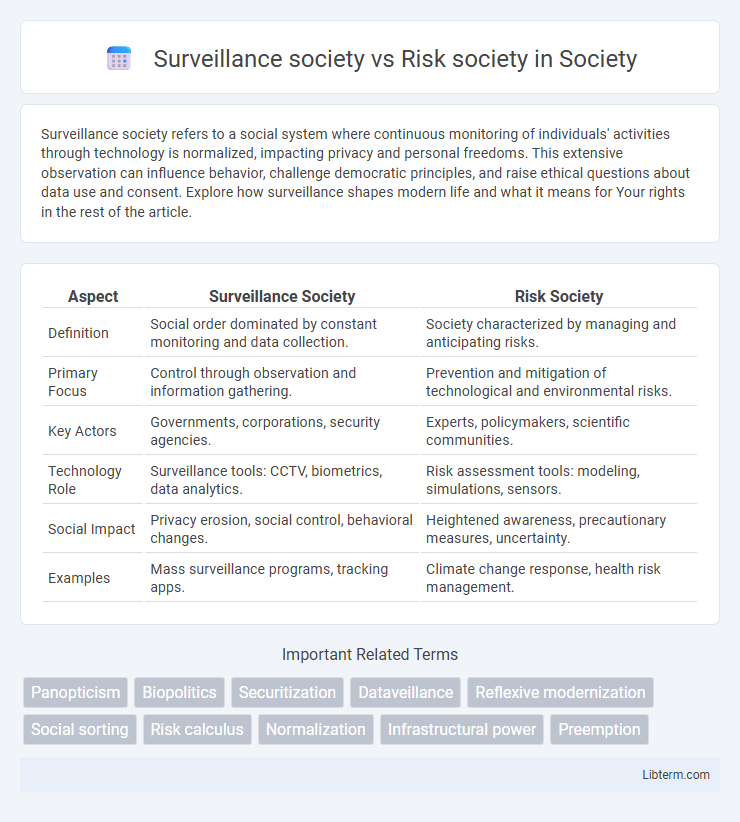Surveillance society refers to a social system where continuous monitoring of individuals' activities through technology is normalized, impacting privacy and personal freedoms. This extensive observation can influence behavior, challenge democratic principles, and raise ethical questions about data use and consent. Explore how surveillance shapes modern life and what it means for Your rights in the rest of the article.
Table of Comparison
| Aspect | Surveillance Society | Risk Society |
|---|---|---|
| Definition | Social order dominated by constant monitoring and data collection. | Society characterized by managing and anticipating risks. |
| Primary Focus | Control through observation and information gathering. | Prevention and mitigation of technological and environmental risks. |
| Key Actors | Governments, corporations, security agencies. | Experts, policymakers, scientific communities. |
| Technology Role | Surveillance tools: CCTV, biometrics, data analytics. | Risk assessment tools: modeling, simulations, sensors. |
| Social Impact | Privacy erosion, social control, behavioral changes. | Heightened awareness, precautionary measures, uncertainty. |
| Examples | Mass surveillance programs, tracking apps. | Climate change response, health risk management. |
Introduction to Surveillance Society and Risk Society
Surveillance society refers to a social system where monitoring technologies and data collection practices are extensively embedded to track individuals' behaviors and activities. Risk society emphasizes the management and assessment of potential hazards and uncertainties stemming from technological, environmental, or social changes affecting modern life. Both concepts shape contemporary discussions on control, privacy, and societal resilience in the face of evolving threats.
Historical Evolution of Surveillance Practices
Surveillance society emerged from early state practices of monitoring populations through census-taking and secret police activities, evolving with technological advancements like CCTV and digital data tracking. In contrast, risk society theory, introduced by Ulrich Beck, highlights how modern societies focus on managing global risks related to environmental hazards, terrorism, and technological uncertainties rather than solely controlling populations. The historical evolution of surveillance reflects a shift from centralized observation for social order to complex systems addressing diffuse risks in interconnected, digital environments.
Core Principles of Risk Society Theory
Risk society theory centers on the distribution and management of risks produced by modern technological and industrial processes, emphasizing uncertainty, reflexivity, and the central role of expert knowledge in identifying and mitigating hazards. Unlike surveillance society, which prioritizes data collection and monitoring for control and security purposes, risk society theory highlights how societies must navigate and negotiate new, invisible risks that challenge existing social structures and require adaptive governance. The core principles include the recognition of manufactured risks, the erosion of traditional safeguards, and the increasing complexity and global reach of risk management practices.
Technologies Shaping Modern Surveillance
Surveillance society relies heavily on ubiquitous technologies such as facial recognition, GPS tracking, and AI-powered data analytics to monitor and control populations in real time. Risk society, defined by Ulrich Beck, emphasizes the management of global risks through technologies like predictive modeling, sensors, and big data to anticipate threats and mitigate hazards. Emerging technologies such as blockchain for secure data storage and machine learning algorithms for behavior prediction are increasingly shaping the dynamics between surveillance imperatives and risk governance.
The Role of Security in Risk Governance
Security plays a central role in risk governance by managing uncertainties and protecting societal values amid potential threats. In a surveillance society, security mechanisms rely heavily on monitoring and data collection to preempt risks, often prioritizing control and prevention. Conversely, a risk society approaches security through adaptive risk assessment and decentralized governance, emphasizing resilience and the mitigation of complex, systemic dangers.
Privacy Concerns in a Surveillance Society
Surveillance society intensifies privacy concerns as pervasive monitoring technologies collect vast amounts of personal data, often without explicit consent, leading to potential misuse and loss of anonymity. Unlike risk society, which addresses systemic uncertainties, surveillance society prioritizes data control and behavioral regulation, raising ethical questions about individual autonomy. The omnipresence of surveillance cameras, biometric systems, and digital tracking mechanisms creates a landscape where privacy erosion becomes a critical social and legal challenge.
Social Impacts of Risk Management Strategies
Risk management strategies in a risk society often lead to heightened surveillance practices aimed at preventing potential harms, significantly impacting social trust and individual privacy. These strategies can create social divisions by disproportionately targeting marginalized groups, reinforcing inequality and social exclusion. The pervasive monitoring inherent in surveillance societies may induce behavioral changes, fostering a climate of fear and self-censorship.
Surveillance, Trust, and Social Control
Surveillance society intensifies social control through extensive monitoring technologies, reducing individual privacy while fostering compliance based on perceived observation. Trust shifts from interpersonal relationships to institutional reliance, as surveillance mechanisms create a framework of accountability and deterrence. Risk society, in contrast, emphasizes managing uncertainties and threats, yet surveillance remains a pivotal tool for anticipating and mitigating risks within social systems.
Policy Responses to Risks and Surveillance
Policy responses to risks in surveillance societies often emphasize regulatory frameworks that balance data privacy with security needs, incorporating advanced technologies like AI for monitoring while enforcing strict oversight to prevent abuse. In contrast, risk societies prioritize adaptive governance models that address complex, systemic risks through transparency, public engagement, and precautionary principles to mitigate uncertainties and potential harms. Both approaches necessitate interdisciplinary collaboration to develop effective policies that safeguard individual rights while managing emerging threats in a digitized and interconnected world.
Future Trajectories: Balancing Surveillance and Risk
Future trajectories in surveillance society emphasize the integration of advanced biometric technologies and predictive analytics to enhance security while navigating privacy concerns, pushing toward more transparent data governance frameworks. Risk society trends highlight the growing importance of adaptive risk management strategies that prioritize resilience and ethical accountability in the face of uncertain global threats like climate change and cyberattacks. Balancing surveillance and risk entails creating hybrid models where AI-driven monitoring tools coexist with robust societal safeguards to mitigate misuse and promote public trust.
Surveillance society Infographic

 libterm.com
libterm.com